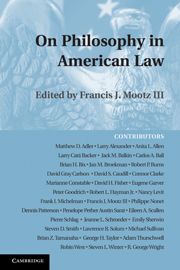Book contents
- Frontmatter
- Contents
- Introduction
- PART I KARL LLEWELLYN AND THE COURSE OF PHILOSOPHY IN AMERICAN LAW
- PART II PHILOSOPHICAL PERSPECTIVES ON LAW
- 7 Toward Normative Jurisprudence
- 8 Critical Legal Theory Today
- 9 Reviving the Subject of Law
- 10 Law and Creativity
- 11 The Stories of American Law
- PART III AREAS OF PHILOSOPHY AND THEIR RELATIONSHIP TO LAW
- PART IV PHILOSOPHICAL EXAMINATIONS OF LEGAL ISSUES
- PART V LAW, RHETORIC, AND PRACTICE THEORY
- PART VI QUESTIONING THE RELATIONSHIP BETWEEN PHILOSOPHY AND AMERICAN LAW
- PART VII COMMENTARIES
- Contributors and Selected Bibliography
- Name Index
- References
11 - The Stories of American Law
Published online by Cambridge University Press: 31 July 2009
- Frontmatter
- Contents
- Introduction
- PART I KARL LLEWELLYN AND THE COURSE OF PHILOSOPHY IN AMERICAN LAW
- PART II PHILOSOPHICAL PERSPECTIVES ON LAW
- 7 Toward Normative Jurisprudence
- 8 Critical Legal Theory Today
- 9 Reviving the Subject of Law
- 10 Law and Creativity
- 11 The Stories of American Law
- PART III AREAS OF PHILOSOPHY AND THEIR RELATIONSHIP TO LAW
- PART IV PHILOSOPHICAL EXAMINATIONS OF LEGAL ISSUES
- PART V LAW, RHETORIC, AND PRACTICE THEORY
- PART VI QUESTIONING THE RELATIONSHIP BETWEEN PHILOSOPHY AND AMERICAN LAW
- PART VII COMMENTARIES
- Contributors and Selected Bibliography
- Name Index
- References
Summary
Caleb was finishing the first grade, and although it couldn't be said that he loved school, he certainly did love his teacher. Ms. Casey was her name, and she seemed to adore all the kids.
One of the kids in Caleb's class was named Gabrielle, and late in the school year, Caleb announced to his parents, “Ms. Casey likes Gabrielle the best.” He said it matter-of-factly, without a hint of envy or disappointment, but still, it wasn't the kind of thing that his parents wanted to let stand.
“We are sure,” they told him, “that Ms. Casey likes all the kids equally.”
“Yeah, probably,” he replied, “she likes all the kids equally.” He took off his glasses, and rubbed his eyes. “And she likes Gabrielle the best.”
They knew better than to argue the point. As parents, they had learned what lawyers too often forget: that some arguments are not worth having. Instead, they asked him: “What makes you think Ms. Casey likes Gabrielle the best?”
He pondered it. “Well, Ms. Casey put a sign on Gabrielle's desk.”
“Well, what did the sign say?”
“I don't know, “he said, “I can't read. Don't you remember that?”
“Yes, we remember. Well, what do you think the sign said?”
“Hmm,” he literally stroked his chin, assuming his most pensive pose. “Probably,” he offered, “the sign said ‘I like Gabrielle the best.’”
- Type
- Chapter
- Information
- On Philosophy in American Law , pp. 88 - 96Publisher: Cambridge University PressPrint publication year: 2009



